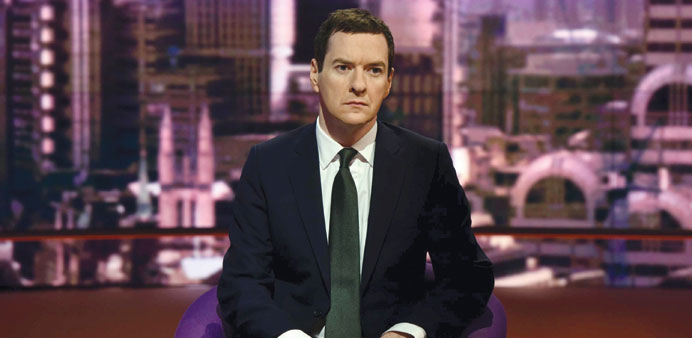Guardian News and Media/London
The UK could join the aerial bombing campaign against Islamic State in Syria before Christmas, the Chancellor, George Osborne, has indicated, as David Cameron prepares to propose extending RAF involvement in parliament this week.
The prime minister is expected to make the argument to MPs for airstrikes in Syria in the coming days; he will give them up to a week to digest his argument before deciding whether to call a Commons vote before the December recess.
Cameron will travel to Paris today to discuss the fight against IS with the French President, Francois Hollande, amid speculation in Westminster that political opinion has shifted in favour of British involvement in Syria.
The unanimous support in the UN Security Council for a resolution calling on member states to take all necessary means to eradicate IS in the wake of the Paris assault is believed to have helped change the mood among MPs. Cameron is likely to make a statement in parliament on Thursday, the day after Osborne’s spending review.
The chancellor said MPs would not be given a vote until Cameron is sure he going to win, but there are already signs that previous Tory sceptics, including Crispin Blunt, the chair of the foreign affairs select committee, has switched sides.
Labour remain in disarray with John McDonnell, the shadow chancellor, insisting that Corbyn was not planning a whipped vote on Syria. The reassurance comes after Corbyn indicated a free vote “was not something (the Labour leadership) is offering”.
The shadow cabinet is likely to discuss the whipping arrangements at its regular meeting on Tuesday, but it is significant that two of Corbyn’s closest political allies -McDonnell and Diane Abbott - support a free vote.
Speaking on the BBC’s Andrew Marr show, McDonnell said he hoped the Commons could act as one and put aside party differences. He put the emphasis on regional forces on the ground, as opposed to airstrikes, saying the country needed to learn from the mistakes of the past.
Corbyn and his allies, however, remain adamantly opposed to war. There are concerns that if he does not give a free vote, he may see mass resignations from the shadow cabinet. Speaking on BBC Radio 5 live, Angela Eagle, the shadow leader of the house, acknowledged that the UN Security Council resolution passed at the request of the French on Friday did not formally authorise military action, but added “it is the kind of resolution that was used in Iraq”.
Speaking on the BBC’s Andrew Marr programme, Osborne said: “Britain is not a country that stands on their sidelines and let others protect it. We cannot wait for that civil war to end before taking the fight to its base in IS in Syria, and that requires the RAF in my view taking part in the international efforts that are going on to degrade that.”
He added: “The UN vote has shown there is an international determination to deal with this pure evil. We will call the vote when we are confident to win it. In the week ahead the prime minister will come to the Commons and respond to the foreign affairs select committee report on the broader case for action in Syria, we will allow MPs to digest that response and then we will see where we stand.
“Britain is not a country that allows others to do its work for it. This organisation (IS) has killed British tourists in Tunisia, it has planned plots against our citizens in Britain, it has killed people on the street in Paris and it has blown up a Russian airliner. This is a threat against us all.”
He added: “There is a big question for Britain: whether we want to shape the world or be shaped by the world. For my generation the combination of the Iraq war and the big economic recession meant that Britain retreated within itself a bit”.
Osborne said it was always possible to calculate the price for foreign intervention, but there were also costs for non-intervention.
In another boost to those seeking a Commons majority for airstrikes, the DUP leadership at the weekend suggested it was about to back war. Nigel Dodds, the Democratic Unionist leader at Westminster, said in a weekend speech: “We have always said we can back British military force, provided it is realistic and in the national interest. The scene is set for our action being just that. It falls to David Cameron to show us that it will be. Not least, he will need to show that we will get right the things we got wrong in Libya.”

Chancellor of the Exchequer George Osborne takes part in the Andrew Marr Show in BBC studios in London yesterday.
